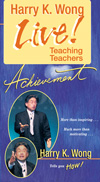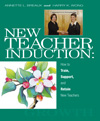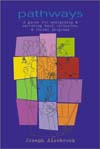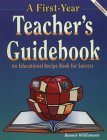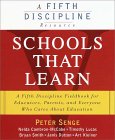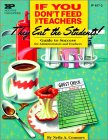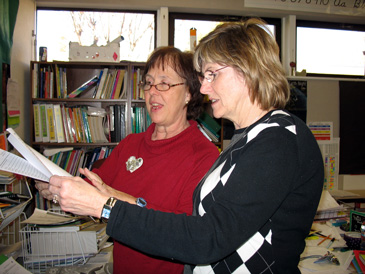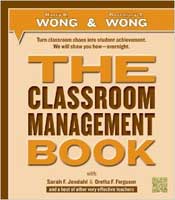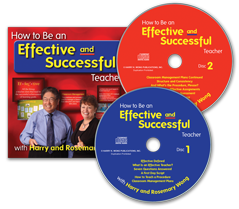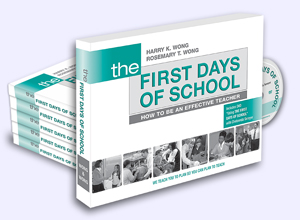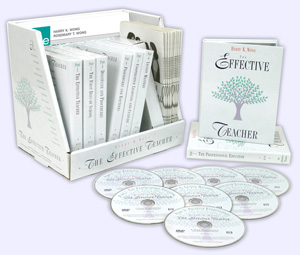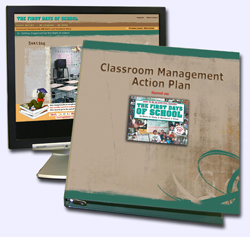|
 |
Subscribe for free home delivery |
 The First Days of School with Enhanced CD, Never Cease to Learn The First Days of School with Enhanced CD, Never Cease to Learnby Harry & Rosemary Wong $23.96 from Amazon.com More information
8 DVDs, with Facilitator's Handbook in PDF, book The First Days of School, and storage case, $695.00 from EffectiveTeaching.com (volume discounts available)
$12.57 from Amazon.com
$20.95 from Amazon.com
$13.30 from Amazon.com
$17.95 from Amazon.com
$24.50 from Amazon.com
$16.76 from Amazon.com
$13.96 from Amazon.com |
|
Academic Coaching Produces More Effective Teachers | |||||||||||||||
| by Harry & Rosemary Wong Special to the Gazette March 1, 2008 |
|||||||||||||||
|
Coaching is six times more effective than class-size reduction.
Importance of Academic Coaches Baseball season and Spring Training are upon us. A major league baseball team signed Bill Carpenter, now a retired elementary school principal, when he graduated from high school. At training camp, he recalls, the camp was crawling with coaches. They had coaches for pitching, hitting, catching, base running, outfield play, infield play, sliding, base stealing, taking signals, and warming up drills, just to name a few. They did not give each player a mentor who he could go to if he had a question. There were coaches who were skilled in certain areas and each had a responsibility to bring out the best in every player under the coach’s tutelage. In turn, the coaches met with the manager on a regular basis to assess the progress of each player. Baseball, like a school, is a team function, and everyone needs to know the culture of the team and how it operates in harmony and unison. The most effective schools have coaches. The coaches meet with the principal on a regular basis to assess the progress of every teacher and student. In an effective school, everyone functions as a team and there is a laser focus on student achievement. Responsibility as a Reading Coach When a new teacher joins the staff at Caldwood Elementary School in Beaumont, Texas, he or she will find coaches such as Angie Cook.
Angie is a reading coach with a strong knowledge of providing effective reading instruction. She also has received training in how to work effectively with peer colleagues. These are her responsibilities:
Improved Reading Scores Angie provides bi-weekly professional development meetings with each grade level. Meetings include looking at student data, looking at strengths and weaknesses of the kids, make and take for the reading stations, etc. She usually does walk throughs three days a week and sits in classes for the 90-minute block twice a week. She visits in rooms to observe a particular child or problem a teacher is experiencing. With the new teachers she is in their rooms modeling lessons, sometimes piggybacking off the teacher. She also helps with lesson plans, classroom organization and management, and procedures for the stations. K-2 students participate in two reading stations plus a teacher station each day. She helps the teachers focus particular attention on the kids who are struggling and follows their station activities to make sure they can do the work or provides activities for the children to do on their level of achievement. It may be as simple as teaching them an easier way to play a game or help with a reading assignment out of the book. She reads all four lessons from each Teacher’s Edition, one per grade level, each day. If there is a difficult part, she tries to help them adapt or make an activity that will help. The teachers know that when Angie is in the room it is only to help, and they feel comfortable asking her a question or if she would teach a particular concept. As a coach, she is constantly reinforcing great teaching—bragging, writing notes, putting little gifts in the mailboxes (without her name) so they will know they are loved and appreciated. Angie says, “I find the more I can do for them, the more they give back to me! I truly LOVE my job and look forward to going to work each day.” Does Coaching Work? Working collegially, the staff of the Caldwood Elementary School is proud that their Texas Assessment of Knowledge and Skills (TAKS) scores in 3rd grade improved in reading for the last two years, with a passing rate of 93-96% in the last three years. The Texas Primary Reading Inventory (TPRI) scores have increased within the last three years with most children on grade level. Angie is proud to share, “In kindergarten, I have seen kids come in and behave like they have never been out in public or given a pencil or book. They can’t speak full sentences, don't know their names, or how to write them. The kids do not know their letters or sounds. A few days later, I see that same child beginning to bloom—talking, writing, participating in station activities. At Caldwood, we take what we get and work hard to make them into successful learners!” Before reading on, please take a moment and reflect on this question: Can a mentor achieve these results? Angie says that the school is a hodgepodge of cultural, socio-economic, and transient students, but she proudly states, “Our teachers in K-3 work very hard to ensure all students can read and succeed.” On a Personal Note Angie shares that about ten years ago when her own son was having reading difficulties, she couldn’t find anyone to help her ‘fix’ him. Frustrated, she began taking extensive reading courses such as Reading Recovery® and Master Reading Teacher (MRT). Both courses proved to be the help she needed to diagnose his reading problems and also found strategies to help improve his reading comprehension and fluency. She didn’t stop with him. She began grabbing kids that people told her couldn’t read and began a second job as a reading tutor. About ten years ago she had a most humbling experience. A father came into her classroom to thank her for helping his child learn to read. Angie relates, “With tears rolling down his face, he told Angie that he had given Joshua the gift of life, but I had given Joshua the gift of a lifetime of success—the ability to read. “What an awesome job our teachers of K-3 have to make the difference in so many lives.” Coaches, Team Leaders, and More The Hopewell School District, featured in last month’s column, gives each of their new teachers a buddy, and several coaches and academic team leaders. The success of their program can be seen by clicking here. “Simply assigning a mentor teacher does little to remedy the situation of teachers becoming discouraged and leaving the profession. Induction and mentoring must go hand-in-hand. You cannot do one without the other.” Susan Wynn and her colleagues at Duke University found that there is no consensus on what mentors should do, what they actually do, and what novices learn as a result of mentoring. Their results did not find a relationship between mentoring and teacher retention—much less improved student achievement. Click here to see her research and a significant summary of the research on mentoring and induction. The concern is not mentoring. The issue is when a new teacher gets only a mentor and that program is incorrectly labeled as “comprehensive.” Mentors are an important component of the induction process, but so are coaches. Mentors are typically available for one year, whereas, coaches are available for many years. Coaches are in the classrooms with the teachers and the students. The work is job-embedded, which is how teachers learn best to become skilled and effective. The reason coaches succeed with improving student learning is because coaches have a defined responsibility. Just as a sports coach or an executive coach have responsibilities, educational coaches have similar responsibilities of producing proficiency, too. Responsibilities of an Academic Coach
Vallorie Borchardt is an academic coach at the John Adams Elementary School in a Madera, California. She is shown here with Vickie Rowlett, a fifth grade teacher, who has been working on her benchmark writing scores. Vallorie's responsibility is to assist with the full implementation of the district adopted core program. These are her specific responsibilities:
Whereas mentoring is usually a one-on-one relationship, coaches work one-on-one and in teams. Vallorie also does the following:
In comparing the role of a mentor and the responsibilities of a coach, it should be obvious which one produces results that lead to student learning. Coaching Works With prior teaching experience at parochial schools, Vallorie was hired at John Adams Elementary School in 1998. She started coaching in 2002-2003 when a majority of the elementary schools in the district put one or two coaches on each staff. She had been teaching at this school for four years and was just finishing her master’s program in Reading and Language Arts at the California State University of Fresno. Vallorie has the responsibility of being the combined Literacy and English Language Development (ELD) Coach. Schools with a higher population of English Language Learner (ELL) students, have both Literacy and ELD Coaches. Recently, schools at risk in her district have been adding math coaches and the junior and senior high schools have added academic coaches. Again, does coaching work? Working collegially, notice the impact coaching has had on the school and student learning. The Impact of Coaching California has an Academic Performance Index (API). It compares how a school’s students as a whole perform relative to other schools in California. Scores range from 200 to 1000 with 800 being the target for schools. The index takes into account the California Standards Tests (CST).
In 2006 John Adams Elementary School was chosen as a California Distinguished School. The following year they applied for a No Child Left Behind Blue Ribbon School distinction. They missed getting this award by two points, but were honored with the California Blue Ribbon distinction. Before reading on, please take a moment and reflect on this question: Can a mentor achieve these results? Vallorie’s Plan Vallorie works with the principal and assistant principal to review scores and discuss who she should target for demonstrations, one-on-one coaching, and for them to observe and provide helpful coaching. The Literacy Coaches meet once a month to network, read articles about coaching, review and understand California standards, confer about assessments, and come to a consensus about everyone doing the same thing in the district. The coaches are the link between the school and district (a more informal setting than administrations, but has proven to be very powerful), between the teachers and administration, and sometimes between teachers, tracks, and grade levels. As a coach, Vallorie has a big picture of the district and its goals, a big picture of a coach’s responsibilities in the district, and a big picture of her own school from a teacher’s and administrator’s view, although she is not an administrator but works closely with her principal and assistant principal. Having knowledge of curriculum, district goals, and implementations at other schools in the district gives her insight as to what needs to be worked on at her school, where they are excelling, and where they can go for help. Vallorie says, “I love this job. I have learned so much and get to do so many different things. I'm almost always on the go in many directions—assessments, ELA curriculum, ELD curriculum and assessment, follow up, professional development, finding something for a teacher who asked or for a teacher where I see a need, etc.” The Research Is Very Specific The concept of comprehensive induction can be applied to almost any profession. Doctors, lawyers, engineers, and other professionals must all prove their abilities BEFORE they are allowed to practice their professions independently. They are not placed in professional settings and told to rely on their “mentors” if they have any questions. Tragically, many new recruits in a school district receive little or no training as classroom teachers. Giving them only a mentor exacerbates the problem. Mentors must not replace or be the only form of formal or informal induction assistance. If this is not taken into account, there is the danger that mentors will be viewed incorrectly as substitutes for the school community whose professional responsibility it is to assist teachers in becoming successful in their new work setting. Any organization relying SOLELY on the concept of “mentoring” to support its junior members is jeopardizing its professional responsibility and survivability. When a professional football organization drafts new team members, these new members, though already versed in rudiments of the game, are not simply provided with “mentors” to ensure their success and ongoing development. Instead, ALL members of the organization provide structured training and ongoing support to foster optimal skill development in the new member during the “induction” process. And much of this training takes place BEFORE the season begins. The research is very specific: Well trained, skilled, and effective teachers produce student learning. Rise in Student Achievement Adams County School District 12 in Thornton, Colorado, uses a “student achievement coach” in each school to coach teachers in three areas:
The student-achievement coach’s responsibility is to help all teachers, not just the beginning teachers, because becoming a proficient and effective teacher is a life-long process. Adams County School District 12 already had coaches for reading and writing when they added the position of student achievement coach. Superintendent Michael F. Paskewicz says, “The coaching model has been a critical component in the rise of student achievement.” The coaches themselves get about two days of training a month as well as their own coach from the central office. At the school district, there is vertical coherence from the superintendent to the new teacher in their professional development program as opposed to schools that just give their new teachers mentors without monitoring or assessing the process. Click here to read more about Adams County School District 12 and “Coaching Teachers to Help Students Learn.” Coaching has become the tool of choice for striving districts. This reflects the dissatisfaction with the past methods districts used to grow and develop their teachers, such as workshops and mentors. Coaching assistance is sustained, job-embedded, and the transfer and implementation is immediate. Jean Rutherford with the National Center for Educational Accountability in Austin, Texas, says, “Our group hears constantly from high-performing elementary schools about the value of a reading and a math coach.” In comparing coaches to other forms of help to increase student learning, education economist, Eric A. Hanushek analyzed data from Washington state. He found that $100 spent on classroom coaches would net student-learning gains “very similar” to those that the same amount spent on full-day kindergarten would achieve. And the gains from coaching would be about six times more than the gains from spending money on class-size reduction. Please Share with Us The concept of a manager meeting with the coaches to map strategy for growth and productivity is a common practice in the private and non-profit sector. If you are a principal who meets regularly with your coaches to plan for teacher proficiency and student success, please let us hear from you at HWong@harrywong.com. Teaming Up for Children The old notion of the lone school marm locked in a classroom of homogenous children is slowing giving way to a new image of teaching—one of a group of people gathered together, sharing, and working towards achievement gains for a room full of assorted sizes, colors, and capabilities. Let’s not lose sight of how the bottom line is measured in education—student achievement. The more people working towards that goal and the more the responsibility is shared, the better the chances are for improvement increase. “Two heads are better than one” is a truism that can be certainly applied to this new era of accountability. And how is this being accomplished? As defined by the American Heritage® Dictionary of the English Language: With Coaches—A person who gives instruction With Lead Teachers—To serve as an example; a precedent With Mentors—To serve as a trusted counselor or teacher With Teachers—One who imparts knowledge or skill to And with Collaboration—To work together, especially in a joint intellectual effort Be a part of a team effort to support children.
If you are already in a setting with collaborative teams, coaches, and the like, please share with us how it runs so we can share it with others. Let us hear from you at HWong@harrywong.com. We all are responsible for making sure that each time a child steps up to the plate, it results in the child getting on base and making it to home plate—scoring—success. The ultimate goal of Bill Carpenter's Spring Training coaches was to put runs on the scoreboard. Our ultimate goal is student achievement.
| |||||||||||||||
|



